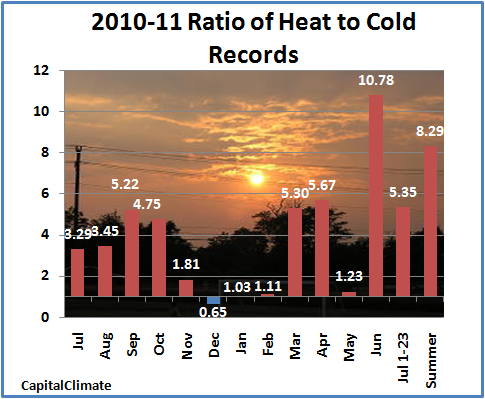It’s a record-setting heat wave, but the conservative media deny even that
By Joe Romm
27 Jul 2011 One way to tell if a nationwide heat wave is truly record-breaking is, well, to look at the total number of records that it breaks. Even better is to compare the high records with the low records, since we have very good historical data and analysis on that — and it covers the whole nation. Steve Scolnik at Capital Climate analyzed the data from NOAA’s National Climatic Data Center (NCDC) and found, “U.S. Summer Heat Records Continue Overwhelming Cold Records By Over 8:1.” These large ratios for the summer and the first 23 days of July are a big deal compared to, for instance, the average over the last decade of about 2-to-1 (see “Mother Nature is Just Getting Warmed Up” and below). But the conservative media can’t even bring themselves to admit that, as Media Matters documents:On his radio show yesterday, Rush Limbaugh declared that “almost no temperature records were broken” during the recent heat wave and that media outlets who reported on “record-breaking” heat were telling “a bunch of lies” to “advance a political agenda of liberalism.” Limbaugh’s remarks echo a Newsbusters post in which Noel Sheppard claims that “almost no temperature records were actually broken.” He came to this conclusion by ignoring most of the temperature records. Nevertheless, Sheppard’s claim was picked up not only by Limbaugh but also Fox Nation:
Citing the NOAA database, Sheppard claims “There were only 34 new all-time daily temperature records set during last week’s ‘record-breaking heat.’ This is out of over 6000 records previously set for each day since such things have been reported.” Actually, it’s not out of over 6000 records “set for each day,” but out of over 6000 records set for all-time at each location. Sheppard is confusing all-time and daily records. See, NOAA keeps track of records for different time scales: The daily record compares the temperature on July 24, for instance, to the temperature on every previous July 24; the monthly record compares the temperature on July 24 to the temperature of any day in July of any year; and the all-time record compares the temperature on July 24 to the temperature of any day in any year. On top of that, NOAA provides these records for both the highest maximum temperature and the highest minimum (nighttime) temperature. Sheppard is reporting the all-time records, describing them as though they are daily records, and ignoring everything else. Here’s the data (from NOAA) on the number of U.S. records broken or tied in the month of July so far:
- All-Time Highest Maximum Temperature: 70
- All-Time Highest Minimum Temperature: 175
- Monthly Highest Maximum Temperature: 125
- Monthly Highest Minimum Temperature: 330
- Daily Highest Maximum Temperature: 2,125
- Daily Highest Minimum Temperature: 4,787
Downplaying the heat wave, Limbaugh claimed “It does this every year.” Is that true? Not according to Christopher Vaccaro, a spokesman for the National Weather Service who told the New York Times that “this is different”:
“One could say, ‘Oh, it’s summer, its late July, it’s hot,’ ” said Christopher Vaccaro, a spokesman for the National Weather Service. “But this is different.” According to Mr. Vaccaro, this heat wave is exceptional not only for its strength, but also for its breadth and duration.
Meteorologist Jason Samenow wrote that “It’s the humidity the sets this heat wave apart – not just in D.C., but over large parts of the country and for a long duration.” Samenow added:
To conclude: where it’s been dry, the day time heat has been unusual; elsewhere, the night time heat and humidity has been unusual. It will take more time and analysis to objectively rank where this heat wave stacks up in the record books, but it’s clear that it’s far from the ordinary.
Jeff Masters, Director of Meteorology for the Weather Underground, writes that “July 2011 is on pace to be one of the five hottest months in U.S. history, but may have a tough time surpassing the hottest month of all time, July 1936.” Masters added that in contrast to the 1930s heat waves, the humidity during the most recent heat wave was high. […]
It’s a Record-Setting Heat Wave, but the Conservative Media Deny Even That


You see how it is, what we're up against in the U.S. They control the discourse.